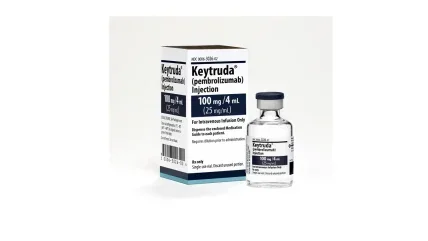
Merck, known as MSD outside the US and Canada, announced that the European Commission (EC) has approved Keytruda (pembrolizumab) in combination with Padcev (enfortumab vedotin-ejfv) to treat certain types of urothelial cancer.
The combination of Merck’s anti-PD-1 therapy Keytruda and Astellas’ antibody-drug conjugate Padcev is now approved as the first-line treatment for unresectable or metastatic urothelial carcinoma in adults.
The EC’s decision follows new clinical guidelines from the European Society for Medical Oncology and the European Association of Urology. These guidelines recommend this combination as the preferred first-line treatment for these patients, regardless of their platinum eligibility.
The approval by the EC follows a positive recommendation from the Committee for Medicinal Products for Human Use (CHMP), received in July 2024.
The recommendation was based on the first interim analysis of the Phase 3 KEYNOTE-A39 trial (EV-302), conducted in collaboration with Pfizer and Astellas.
The trial showed that Keytruda plus Padcev resulted in statistically significant and clinically meaningful improvements in overall survival (OS) and progression-free survival (PFS) compared to platinum-based chemotherapy.
At a median follow-up of 17.3 months, the combination reduced the risk of death by 53% compared to platinum-based chemotherapy.
It showed that 30% of patients in the combination group experienced death versus 51% in the chemotherapy group.
Additionally, the combination therapy reduced the risk of disease progression or death by 55%, compared to 69% in the chemotherapy group.
Merck Research Laboratories senior vice president and oncology, global clinical development head Marjorie Green said: “For the first time in decades, adult patients with unresectable or metastatic urothelial carcinoma have the option of a potential new first-line standard of care that may help extend their lives.”
With this approval, Keytruda is now authorised for three indications in bladder cancer and a total of 28 indications in the European Union (EU).
Previously, pembrolizumab was approved in the EU as a monotherapy for the treatment of locally advanced or metastatic urothelial carcinoma.
In December 2023, Keytruda in combination with enfortumab vedotin was also approved in the US for treating adult patients with urothelial cancer.
Merck, in collaboration with Pfizer and Astellas, is advancing this combination through the KEYNOTE-B15 and KEYNOTE-905 Phase 3 trials for muscle-invasive bladder cancer.
In June, MSD partnered with Immutep to assess the latter’s eftilagimod alfa (efti) with Keytruda and chemotherapy in the Phase 3 TACTI-004 trial in patients with metastatic non-small cell lung cancer (NSCLC).






